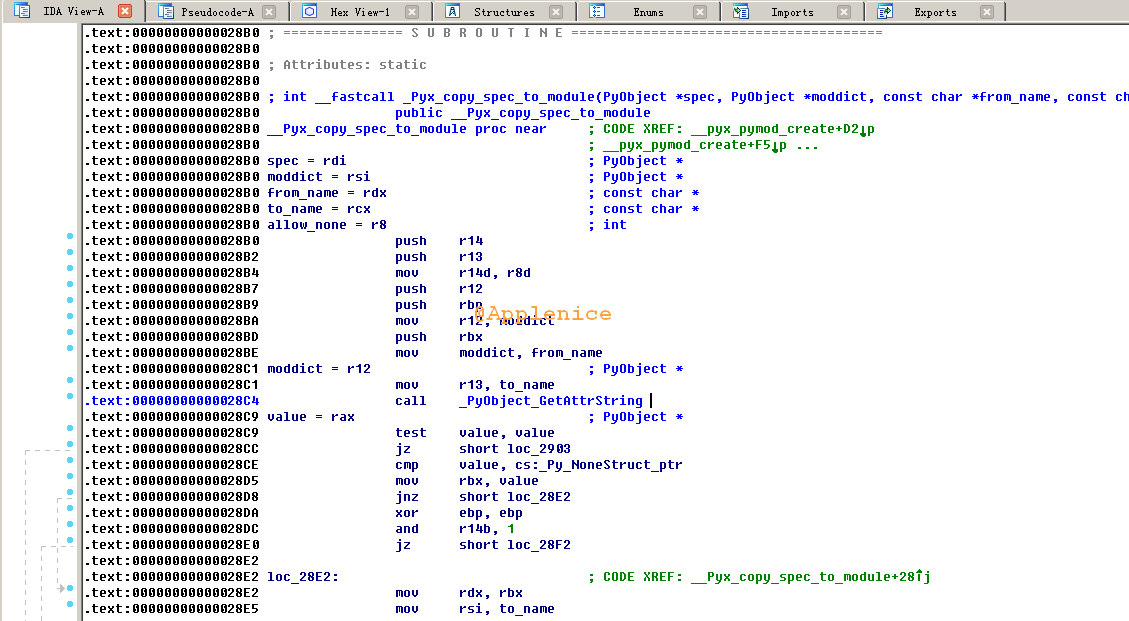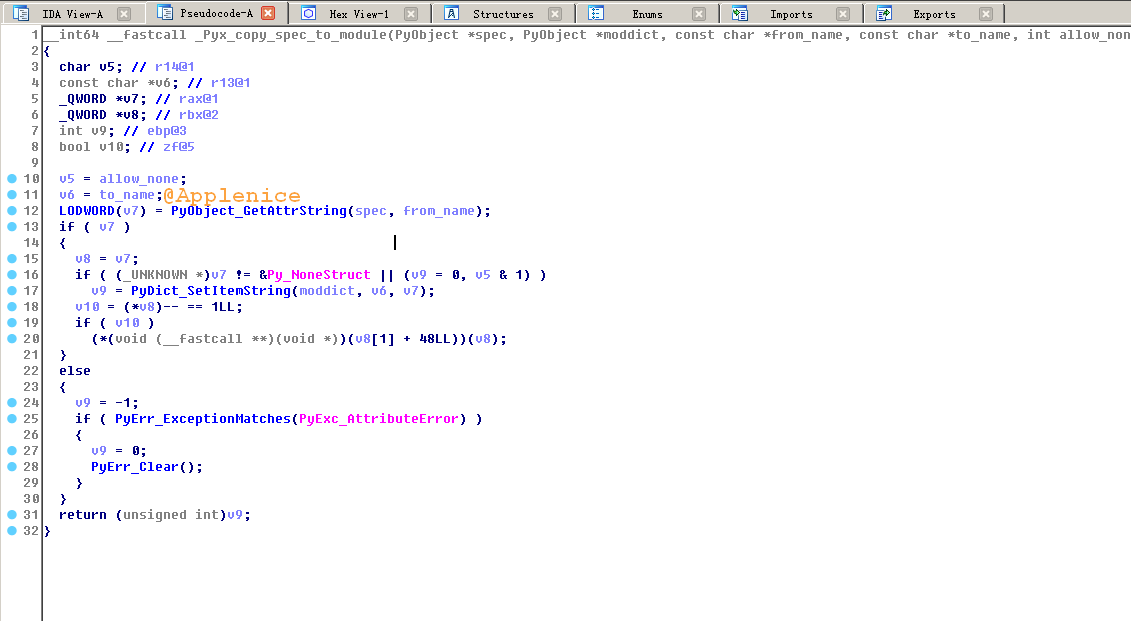在PyInstaller第一弹PyInstaller打包Python代码与其不安全因素验证中验证了稍微研究下就可以获得源码,那么怎么使用Cython来提高点反编译门槛呢?
代码结构
还是以第一弹中的代码为例子,稍作修改,文件结构如下:
1
2
3
4
5
6
| $ tree
.
├── calc.py
└── exec.py
0 directories, 2 files
|
假设我们不希望别人能通过第一弹的方式获取calc.py的源码,想对其加密,由exec.py进行调用,分别看一下calc.py和exec.py的代码内容:
1
2
3
4
5
6
7
8
9
10
11
12
13
14
|
import numpy as np
class Calc:
def __init__(self):
self.a_array = [[1, 0], [0, 1]]
self.b_array = [[4, 1], [2, 2]]
def calc_matmul(self):
return np.matmul(self.a_array, self.b_array)
|
1
2
3
4
5
6
7
8
9
10
11
12
|
import sys
sys.path.append('./calc/')
from calc import Calc
if __name__ == '__main__':
c = Calc()
result = c.calc_matmul()
print(result)
|
Cython编译
我们现在将calc.py编译为SO文件,新建setup.py,写入如下内容:
1
2
3
4
5
6
7
8
9
10
|
from distutils.core import setup
from distutils.extension import Extension
from Cython.Build import cythonize
ext_modules = [
Extension("calc", ["calc.py"]),
]
setup(name='calc', ext_modules=cythonize(ext_modules), requires=['Cython'])
|
然后进行执行编译:
1
2
3
4
5
6
7
8
9
10
| $ python setup.py build_ext
Compiling calc.py because it changed.
[1/1] Cythonizing calc.py
running build_ext
building 'calc' extension
creating build
creating build/temp.linux-x86_64-3.7
x86_64-linux-gnu-gcc -pthread -Wno-unused-result -Wsign-compare -DNDEBUG -g -fwrapv -O2 -Wall -g -fstack-protector-strong -Wformat -Werror=format-security -g -fwrapv -O2 -g -fstack-protector-strong -Wformat -Werror=format-security -Wdate-time -D_FORTIFY_SOURCE=2 -fPIC -I/home/top/CodeWork/Python/ABC/venv/include -I/usr/include/python3.7m -c calc.c -o build/temp.linux-x86_64-3.7/calc.o
creating build/lib.linux-x86_64-3.7
x86_64-linux-gnu-gcc -pthread -shared -Wl,-O1 -Wl,-Bsymbolic-functions -Wl,-Bsymbolic-functions -Wl,-z,relro -Wl,-Bsymbolic-functions -Wl,-z,relro -g -fstack-protector-strong -Wformat -Werror=format-security -Wdate-time -D_FORTIFY_SOURCE=2 build/temp.linux-x86_64-3.7/calc.o -o build/lib.linux-x86_64-3.7/calc.cpython-37m-x86_64-linux-gnu.so
|
将生成的build/lib.linux-x86_64-3.7目录下的calc.cpython-37m-x86_64-linux-gnu.so文件拷贝至calc目录:
1
2
| $ mkdir calc
$ cp build/lib.linux-x86_64-3.7/calc.cpython-37m-x86_64-linux-gnu.so calc
|
spec文件加入so
按照第二弹PyInstaller与资源文件的方式生成spec文件:
1
2
3
| $ pyi-makespec --onefile exec.py
wrote /home/top/CodeWork/Python/ABC/addso/exec.spec
now run pyinstaller.py to build the executable
|
将刚编译好的so文件加入datas中:
1
2
3
4
5
6
7
8
9
10
11
12
| a = Analysis(['exec.py'],
pathex=['/home/top/CodeWork/Python/ABC/addso'],
binaries=[],
datas=[("./calc/calc.cpython-37m-x86_64-linux-gnu.so", "calc")],
hiddenimports=[],
hookspath=[],
runtime_hooks=[],
excludes=[],
win_no_prefer_redirects=False,
win_private_assemblies=False,
cipher=block_cipher,
noarchive=False)
|
进行打包:
现在就和之前一样了,拷贝到另一台机器做测试:
1
2
3
4
| $ chmod +x exec
$ ./exec
[[4 1]
[2 2]]
|
这样就成功的将PyInstaller与Cython结合使用,能在一定程度上提高反编译门槛,保护我们的源码。顺便看一下反编译SO文件的样子吧(到这里真的就只是看看):


结束
PyInstaller连着写了三篇,到这算是告一段落了,实际工作中的情况肯定比文章中举例要复杂的多,后面会不会深入研究其他功能再说吧,比如Bootloader等

